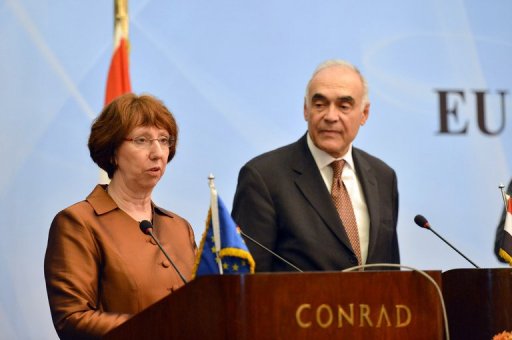By AFP
CAIRO: A career diplomat and minister who survived Egypt’s uprising and three cabinet shuffles, Fayza Aboul Naga is the public face of a diplomatic row with Washington over the trial of democracy activists, including Americans.
The international cooperation minister, one of the few remaining ministers from ousted president Hosni Mubarak’s era, has an uncompromising reputation, and is widely thought to have instigated the probe into NGO foreign funding that led to a trial of 43 activists.
Judicial sources say 19 Americans are among the defendants, accused of receiving illicit foreign funds for their unlicensed groups.
Aboul Naga had told investigating judges in October that Washington, one of Egypt’s closest allies, had used the NGOs to spread “chaos” in Egypt, serving American and Israeli foreign interests.
“The United States and Israel could not create a state of chaos and work to maintain it in Egypt directly, so they used direct funding to organizations, especially American, as a means of implementing these goals,” the official MENA news agency quoted her as saying, in a recent disclosure of the claims.
The minister’s comments, and the subsequent storming of 17 offices belonging to local and foreign NGOs in December, sparked a bitter row with Washington, the Egyptian military rulers’ main foreign benefactor.
Washington said after the raids that it received promises the equipment confiscated from the offices would be returned.
Instead, Egypt went ahead with charging the activists, while state media published sensationalist accounts of a plan to divide Egypt into several countries.
The motives of the minister, who is in her 60s and has carved for herself a powerful role in the military-appointed cabinet as the interlocutor for numerous foreign investors, are unclear.
Top US Republican Senator John McCain said Egypt’s military ruler Field Marshal Hussein Tantawi told him during a visit to Cairo last week that he was working “diligently” to resolve the dispute.
But Aboul Naga seems determined to press ahead with the investigations, while denying they would affect her country’s relations with the United States or impact requested aid from the World Bank and International Monetary Fund.
“She seems very determined to go right to the end in what is becoming a head-to-head row with the United States. It looks as if she is making it a personal issue,” said one civil society representative, requesting anonymity.
“For her, these organizations are working without authorization, implementing a foreign policy agenda in contravention of Egyptian law, which she is determined to enforce,” she said.
Even under Mubarak, who was overthrown by a popular revolt a year ago, the minister was said to have been an inflexible negotiator, said one Western diplomat.
“She remains true to herself,” the diplomat said.
Aboul Naga was the first woman appointed as an Egyptian state minister for foreign affairs.
She graduated from the University of Geneva with a political science degree, and went on to become her country’s representative to the United Nations in Geneva, serving as an advisor to Boutros Boutros-Ghali when he headed the UN.

